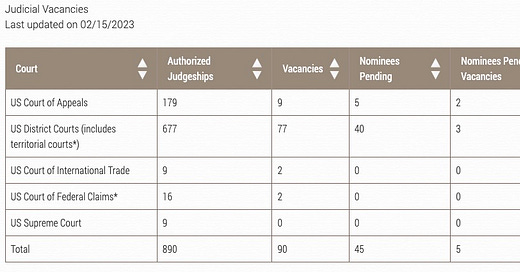How federal judges are appointed.
It is very important that President Biden bring more balance to the federal judiciary.
Photo Credit: uscourts.gov
Issue #255 Government February 16, 2023
Federal judges have been in the news lately, primarily because the disgraced, twice-impeached, former president Donald Trump has been trying to use the far-right judges he appointed to preside over his several court cases.
One of the strongest sets of things that Trump did was to pack the federal courts, including the Supreme Court with far-right conservatives whose views are in conflict with the views of the majority of the American people.
Federal judges have the power to influence every aspect of public policy. They make decisions every day about health care, reproductive rights, bodily autonomy, voting rights, the environment, law enforcement, LGBTQ rights, civil rights, and more.
In general, federal courts may decide cases that involve the US government, the US Constitution or federal laws, and/or controversies between states or between the US and foreign governments. Additionally, federal judges serve in lifetime seats subject to confirmation by the US Senate (with very few exceptions).
The article continues below.
No intrusive ads or annoying popups ever! Instead, please see the important information below and at the bottom of this post. That’s how we grow and sustain this publication. AND, please keep those “Likes” and comments coming! Thanks!
There is new lower pricing for the paid levels at as little as $5.00/month or $50/year!
Paid subscribers with the Substack app are invited to participate in the W.A.S. Chat Room to discuss today’s post.
All posts are free for seven days after their publication. To read all older posts, including the complete archive, and to support us financially, please consider upgrading your subscription to a paid level. Save 17% with an annual subscription. Thank you for your support!
The article continues…
How is the federal judiciary organized?
The Constitution guides the structure of our federal courts. Specifically, Article III of the Constitution establishes the federal judiciary, which currently includes 870 judges. It says there must be one Supreme Court, and Congress gets to decide how many and where there are lower courts.
The federal court system consists of three tiers. At the bottom are federal district courts, also called trial courts. In the middle are the federal appeals courts, also known as the circuit courts of appeal. At the top is the US Supreme Court.
In general, federal courts may decide cases that involve the US government, the US Constitution or federal laws, and/or controversies between states or between the US and foreign governments. Additionally, federal judges serve in lifetime seats subject to confirmation by the US Senate (with very few exceptions).
The 94 judicial districts are organized into 12 regional circuits, each of which has a US Court of Appeals. Cases appealed from district courts go to the appeals, or circuit courts. In addition, there is the Court of Appeals for the Federal Circuit (the 13th circuit court), with nationwide jurisdiction to hear appeals in specialized cases.
Generally, an appeal must be based on a claim that the district court judge committed a legal error. At the circuit court level, cases are typically heard by a panel of three judges, which means that even a few individual judges can be crucial to protecting the basic rights of many, many people.
An appeal of a circuit court decision would go to the US Supreme Court. Because so few cases are accepted for review by the Supreme Court, federal appeals court judges wield tremendous power. If the Supreme Court chooses not to hear an appeal, the decision made by the federal appeals court applies to all the states in the circuit.
How Federal Judges Are Appointed
There are three ways that federal judges can be appointed - by the president, by Congress, or by state legislatures.
This means that the president, Senate, and House of Representatives play important roles in deciding who will take on these Judgeships. The majority of federal judges are appointed by the president.
A simple majority of US Senators present and voting is required to approve a nomination. If there is a tie, the Vice President (who also presides over the Senate) casts the deciding vote.
These appointments are lifetime positions; once someone has been appointed to a judge seat, they remain until their retirement or death. Federal judges can be impeached, although that has been a very rare occurrence throughout America's history.
The Democratic-led Senate recently confirmed President Joe Biden’s 100th federal judge.
The Democrats have made it a priority to reshape U.S. courts with judges who tend to be younger, liberal, and more diverse — both in terms of race and ethnicity, as well as professional experience President Biden also secured Senate approval for 30 circuit court judges and one Supreme Court justice: Ketanji Brown Jackson.
“Appointing 100 judges has already had a major impact on the judiciary — and it puts President Biden on track to name a transformational 200 judges before the end of this term,” Ron Klain, Biden’s former chief of staff told NBC News. “Just as important as the quantity of judges is their quality, professional background, and diversity. President Biden’s history-making contribution to judicial appointments isn’t just ‘breaking the mold’ of prior federal judicial picks — it’s making a whole new one.”
Biden has also picked unusually high numbers of public defenders, civil rights lawyers, and labor lawyers compared to his predecessors from both parties.
Confirming judges requires a simple majority in the Senate. Many of Biden’s judges have received some Republican support.
President Biden has been making history with his judicial appointments. He has prioritized diversity in the federal judiciary, putting forward more nominees of color and women than ever before. In addition, he nominated the first openly gay woman to a federal seat in Puerto Rico - another huge step toward achieving fairness and representation in the justice system.
Because only the U.S. Senate approves federal court nominees and the Democrats currently have a majority in the Senate, we can be pretty sure that President Biden will try to fill as many of the current vacancies as possible during his next two years in office.
What are your thoughts about the role of the federal judiciary?
Let us know in the comments or start a dialogue in the chat (for paid subscribers).
Help us to grow our We Are Speaking Substack!
Don’t Forget! If you have the W.A.S. app for iOS and Android, you can listen to each article by clicking the little headset icon. You can also participate in the W.A.S. Chat (for paid subscribers only).
There are many benefits to using the W.A.S. app, including the ability to listen to our posts and podcast episodes straight from the iOS or Android app.
You can always leave any questions in the comments or email us.
Free posts are available for 7 days after publication. Adjust or upgrade your subscription to the paid level here. Pay less than 14¢ per post for the 36 monthly articles and podcast episodes. Thank you for your financial support!
Read the award-winning Detroit Stories Quarterly SciFi Anthology by Keith Owens, et al., with special guest authors. Click before to get a copy.
Our new eBook for independent authors and creative and solo professionals is published! Are you a creative professional or independent author looking to market and brand yourself successfully? Then this is the book for you! Learn practical and targeted marketing and branding strategies that will help you stand out from the competition. Click below to get your copy for just $4.99.
Check out the Global Creative Community Branding and Marketing Academy (GCC BMA) offering online courses networking opportunities, and one-on-one and group coaching for independent writers and creative and solo professionals.











